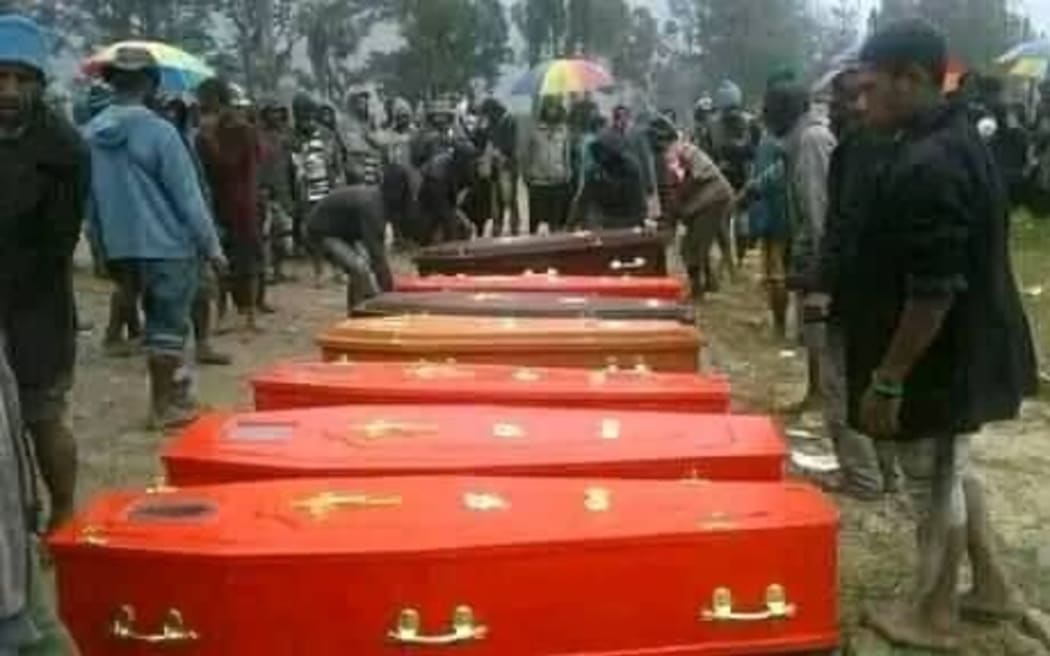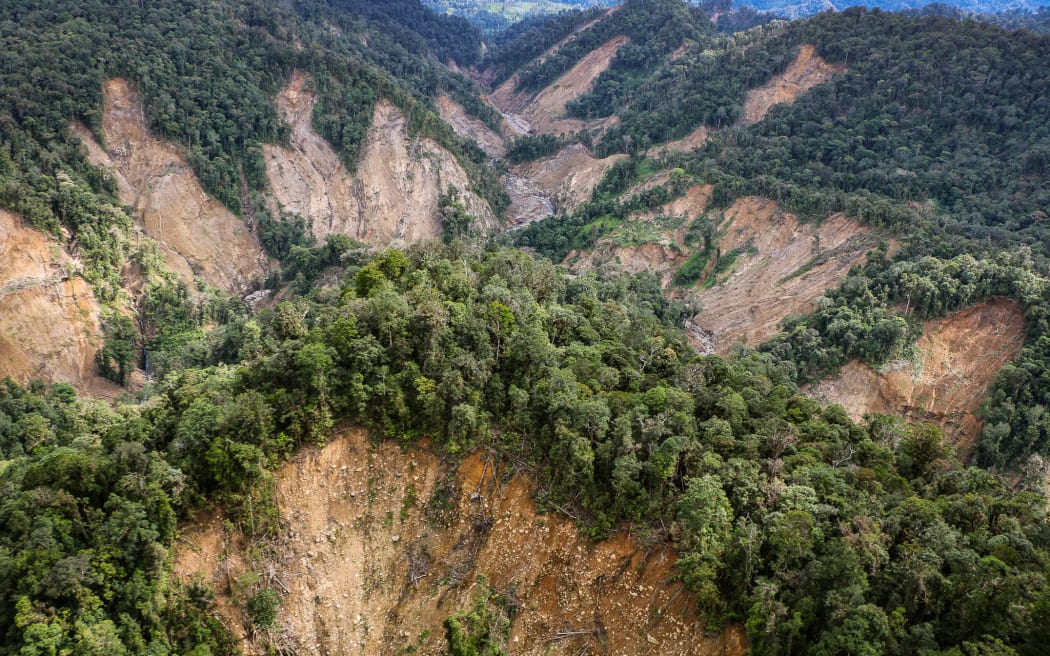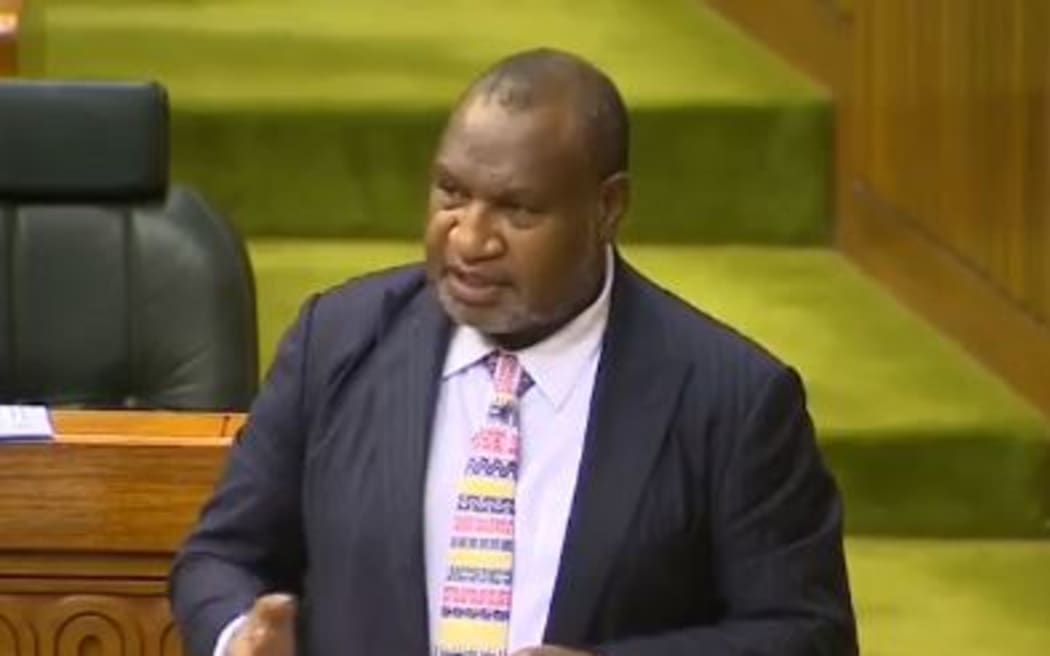Warning: This story contains details that may be distressing to some readers.
By Lydia Lewis, RNZ Pacific journalist, and Scott Waide, RNZ Pacific PNG correspondent
As women and children seek hope of a future without tribal fighting, the cycle of killing continues in Papua New Guinea’s remote Highlands.
Tribal warfare dating back generations is being said to show no signs of easing and considered a complicated issue due to PNG’s complex colonial history.
Following the recent massacre of more than 70 people, community leaders in Wabag held mediation talks in an effort to draw up a permanent solution on Tuesday, with formal peace negotiations set down for yesterday between the warring factions.
A woman, who walked 20 hours on foot with seven children to flee the violence in the remote highlands, was at the meeting and told RNZ Pacific she wants the fighting to stop so she can return home.
In 2019, the then police minister said killings of more than two dozen women and children “changed everything”.
But a tribesman, who has asked to remain anonymous, told RNZ Pacific the only thing that had changed was it was easier to get guns.
Multiple sources have told RNZ Pacific the government appears to be powerless in such remote areas, saying police and security forces are sent in by the government when conflict breaks out, there is a temporary pause to the fighting, then the forces leave, and the fighting starts again.

There are also concerns about a lack of political will at the national level to enforce the law using police and military due to tribal and political allegiances of local MPs, as recommendations made decades ago by former PNG Defence Force commander Major-General Jerry Singirok are yet to be fully implemented.
While the government, police and community groups look at peaceful solutions, mercenaries are collecting munitions for the next retaliatory fight, multiple sources on the ground, including a mercenary, told us.
Killing pays
After “Bloody Sunday”, which left dozens dead in revenge killings, the men with guns were out of bullets.
Tribal fighting in Papua New Gunea’s Enga Province reached boiling point on February 18, fuelled by a long-standing feud between different clans, which resulted in a mass massacre.
The tribesman who spoke to RNZ Pacific said they did not want to fight anymore but believed there was no other option when someone from the “enemy” turned up on their land wanting to burn down their village.
“Prime Minister [James Marape] — we want development in our villages,” he said, speaking from a remote area in the Highlands after his village was burnt to the ground.
There is no employment, no infrastructure, no support, he said, adding that those were the things that would keep people busy and away from engaging in tribal conflict.
At the moment killing people paid, he said.

‘Hundreds of lives lost’
“Businessmen, leaders and educated elites are supplying guns, bullets and financing the engagement of gunmen,” Wapenamanda Open MP Miki Kaeok said.
The MP is worried about the influence of money and guns, saying they have taken over people’s lives especially with the increase in engagement of local mercenaries and availability of military issued firearms.
“Hundreds of lives have been lost. Properties worth millions of kina have been ransacked and destroyed. I don’t want this to continue. It must stop now,” Kaeok pleaded.
Meanwhile, men in the Highlands are paid anything between K3000 (NZ$1300) to K10,000 (NZ$4,400) to kill, the tribesman claimed during the interview.
Then, he called over one of the men involved in that fight, an alleged killer, to join the video interview.
“Um this is the hire man,” he introduced him. “If they put K2000 (NZ$880) for him and say go burn down this village — he goes in groups — they clear the village, they give him money and he goes to his village . . . ”
The “hire man”, standing slouched over holding a machete, looked at the camera and claimed 64 people were killed on one side and eight on another pushing the total death toll to more than 70.
Wabag police told RNZ Pacific on Tuesday that 63 bodies had been recovered so far.
“A lot of people died,” an inspector from Wabag told RNZ Pacific.
The killings have not stopped there; a video has been circulating on social media platforms of what appears to be a young boy pleading for his life before he was killed.
The video, seen by RNZ Pacific, shows the child being hit by a machete until he falls to the ground.
The man who allegedly carried out the brutality was introduced to RNZ Pacific by the tribesman via video chat.
“They recognise that this person was an enemy,” the tribesman — translating for the killer, who was standing in a line with other men holding machetes — told RNZ Pacific.
“This small guy (referring to the dead child) came out of the bush to save his life. But he ended up in the hands of enemies.
“And then they chopped him with a bush knife and he was dead.”
“In revenge, he killed that small boy” because the killer’s three family members were killed about five months ago.
Asked whether they were saddened that children have died in the violence, the killer said: “No one can spare their lives because he was included in the fight and he’s coming as a warrior in order to kill people,” our source translated.
Killing people — “that’s the only way”, they said.
Exporting guns
The source explained military guns are a fairly recent addition to tribal fighting.
He said that while fighting had been going on most of his life, military style weapons had only been in the mix for the last decade or so.
He said getting a gun was relatively easy and all they had to do was wait in the bush for five days near the border with Indonesia.
“We are using high-powered rifle guns that we are getting exported from West Papuans.”
He added the change from tribe-on-tribe to clan-to-clan fighting has exacerbated the issue, with a larger number of people involved in any one incident.
Mediation underway
A Wapenamanda community leader in Enga Province Aquila Kunza said mediation was underway between the warring factions in the remote Highlands to prevent further violence.
“The policemen are facilitating and meditating the peace mediation and they are listening,” Kunza said.
Revenge killings had been ongoing for years and there was no sign of gunmen stopping anytime soon, Kunza said.
“This fight has lasted about four years now and I know it will continue. It occurs intermittently, it comes and goes,” he said.
“When there’s somebody around (such as the military), they go into hiding, when the army is gone because the government cannot support them anymore, the fighting erupts again.”
Kunza has been housing women and children who fled the violence and after years of violence and watching police come and go, he is calling for a community-led approach.
At a large community gathering in Wabag the main town of Enga on Tuesday people voiced their concerns.
“The government must be prepared to give money to every family [impacted] and assist them to resettle back to their villages to make new gardens to build new houses,” Kunza said.
He said formal peace negotiations are taking place today as residents from across the Enga Province are travelling to Wabag today for peace talks between the warring factions.
‘Value life’
Many Engans have lamented that the traditional rules of war have been ignored as children have not been spared in the conflict and societal norms that governed their society have been broken.
A woman who was kidnapped last year in Hela in the Bosavi region — a different area to where the recent massacre took place — and held for ransom said PNG was on the verge of being a failed state.
“I’ve gone through this,” Cathy Alex told RNZ Pacific.
“People told us who gave them their guns in Hela, people told us who supplied them munitions. People told us the solutions. People told us why tribal fights started, why violence is happening,” Alex shared.
She said they managed to find out that killers got paid K2000 (NZ$880) for killing one person, that was in 2017.
“For a property that’s worth K200/300,000 [up to NZ$130,000] that’s destroyed, the full amount goes to the person who caused the tribal fight,” she said.
“How can you not value the life of a person?”

Government help
With retaliations continuing the “hire man” who claims to have killed more than 20 people from warring tribes, said he is staring down death.
“He would have to die on his land because…when they come they will fight…we have to shoot in order to protect my village,” the tribesman explained.
“He said he’s not scared about it. He is not afraid of dying. He got a gun in order to shoot, they shoot him, and that’s finished.”
“He’s really worried about his village not to burn down.”
The tribesman said that without government committing financial support for infrastructure, jobs and community initiatives the fighting will continue.
He also wants to see a drastic change in police numbers and a more permanent military presence on the ground.
“We don’t have a proper government to protect us from enemies in order to protect ourselves, our houses . . . and to protect assets we have to buy guns in order to protect them.”
Parliament urged to act
Last week, the PNG Parliament discussed the issue of gun violence.
East Sepik Governor Allan Bird, who is on the opposition benches, has called on the government “to respond”.
He said the “terrorists in the upper Highlands” needed their guns to be stripped from them.
“We are a government for goodness sake — let’s act like one,” Bird said.
Deputy Prime Minister John Rosso agreed with Bird’s sentiments and acknowledged that the situation was serious.
He called on the whole of Parliament to unite to fix the issue together.
RNZ Pacific has contacted the PM Marape’s office for comment with no response yet.
This article is republished under a community partnership agreement with RNZ.
Article by AsiaPacificReport.nz








